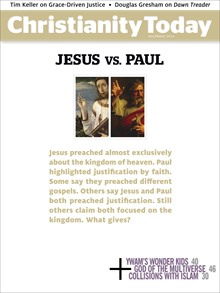Scot McKnight on Kingdom of Heaven and Justification
Scot McKnight responds to the review essays by Kevin Williams and Tony Richie that appeared in the Summer 2011 issue of The Pneuma Review regarding his article, “Jesus vs. Paul” that appeared in the December 2010 issue of Christianity Today.

Scot McKnight, “Jesus vs. Paul” Christianity Today (December, 2010), pages 24-29.
The text appearing on the December 2010 cover encapsulates the discussion: “Jesus preached almost exclusively about the kingdom of heaven. Paul highlighted justification by faith. Some say they preached different gospels. Others say Jesus and Paul both preached justification. Still others claim both focused on the kingdom. What gives?”
I want to thank The Pneuma Review for its response to the piece I wrote in Christianity Today. I believe the gospel issue is the biggest issue we are facing in the church today. Serious discussions need to take place. I believe that what we think the “gospel” is would not have been understood as the gospel in the 1st Century—by Jesus, by Peter or by Paul. Or by anyone else near them. That may sound surprising, but I’m dead serious. We tend to think the gospel is the good news of how we can be saved, and we have constructed a way of presenting this gospel by cobbling together pieces scattered throughout the New Testament. What we mean by “gospel” is the plan of salvation, and it goes something like this: God made each one of us but we chose the path of sin. This same God loves us but God is supremely and fearsomely holy. But because God loves us he has found a way to get us back together: he sent his Son, Jesus, to die for our sins so we can be restored in our relation to God and spend eternity with God in heaven up in the sky somewhere. If we respond to this offer of redemption, our lives will almost certainly be better, and if they don’t God will give us the grace to sustain our faith. By and large I also believe these things, but I’m convinced no one in the 1st Century would hear this and assert, “Yes, that’s the gospel.” They may have agreed with the statement, but they would not have called it the gospel. And because we think this is the gospel, we are missing out on what it is and what it is all about.
In the two pieces in Pneuma Review, the big pushback for me is why I choose to begin with Paul, and the oddity of that move (which goes against the grain of my own career of writing and teaching) will be clear when my book, The King Jesus Gospel, comes out the end of next month [August 2011]. First, only Paul really defines gospel (1 Cor 15), and those who define gospel as I did above are really imposing some things from Paul on Jesus and on the pages of the NT and as a result are providing a meta-hermeneutic of how to read everything in the Bible. That meta-hermeneutic is to read the entire Bible through the lens of Paul’s justification by faith as the personal plan of salvation. But I think this is imposing Paul on the whole Bible in a way that the Bible does not want us to do. (Let me back down just briefly: I believe in personal faith and one dimension of justification is that you and I can be made right with God by trusting in what Christ has done for us.)
I began with Paul because my goal is to beat the Paul imposers at their own game. How? By beginning with Paul, showing that Paul is not saying what they think he is (namely that the gospel is simply justification) and, only then, by showing that in the end Paul’s gospel is the same gospel as Jesus’ gospel.
I see two advantages here: first, by not beginning with Jesus, which I could have done quite easily, it does not look like I’m setting up Jesus in order to impose Jesus on Paul. Second, once I’ve cleared the deck by showing what Paul really means I can show what Jesus really means by “gospel.” I don’t think Paul means simply justification, and I don’t think Jesus means simply social justice or even kingdom—but the story of Israel coming to completion in Jesus himself. Had I begun with that, I don’t think my case would have been as compelling—we’ll see if my case is clear when the book comes out.
Scot McKnight
July 18, 2011
Category: Biblical Studies, Fall 2011


